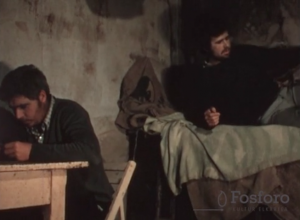
Un hombre vaga por las calles de un pueblo buscando tabaco en botes de basura o en el camino. Al entrar a un bar, un hombre nota que está buscando algo, por lo que lanza tabaco al suelo y cuando el primero se agacha a recogerlo, el otro lo tira al suelo mientras todos en el bar se ríen de él. Al regresar al cuarto en el que vive, otro hombre se encuentra ahí descansando. Los hombres tienen una breve conversación sobre cuándo se irá el otro, mientras que este da una excusa y le pide algo de tabaco al primer hombre. El primero se niega y le dice que el tabaco es muy difícil de conseguir, provocando la ira del segundo, quien decide asesinarlo apuñalándolo por la espalda. Después de enterrar su cuerpo, vuelve al cuarto donde se siente culpable y después de llorar por un rato, decide suicidarse.
A man wanders the streets of a town looking for tobacco in trash cans or the road, he enters a bar and a man notices that he is looking for something, he throws some tobacco on the floor and when the first man tries to reach it, he shoves him to the floor while the rest of the men in the bar laugh at him. When he goes back to the room he lives in, there is another man there resting. They have a small conversation about when the man lying down will leave, he gives an excuse and then asks the other for some tobacco. The first man refuses and tells him it is too hard to get, provoking the anger of the second one who then he chooses to kill him by stabbing him in the back. After burying his body he goes back and feels guilty, after crying for some time, he chooses to kill himself.
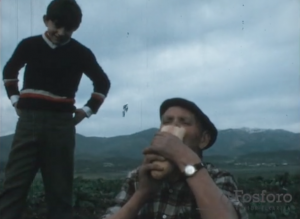
Después de que su padre parte al trabajo, un pequeño niño debe llevarle pan y vino. Sin embargo, el niño se toma mucho tiempo vistiéndose y jugando con una botella en un lago. Su madre le pide apurarse y en el camino el niño bebe el vino y rellena la botella con agua, se esconde para ver a una pareja besarse, le da a su padre el pan y después interrumpe a unos niños jugando. Mientras juegan a esconderse, él se lleva a una niña lejos y la besa, para después seguir huyendo y esconderse en un establo momentáneamente. Al caminar hacia las vías del tren, piensa en todo lo que ha hecho, y se acuesta ahí con los ojos vendados pero al reflexionar sobre sus acciones decide regresar a casa con su madre.
After his father leaves for work, a little kid has to bring him bread and wine. However he takes his time getting dressed and playing with a bottle in a lake, then his mother prompts him to hurry and on the road he drinks the wine and re-fills the bottle with water, he watches a couple kissing, then he gives his father the bread and interrupts some kids playing, then while playing hide and seek he takes a girl far away and kisses her and he keeps running away, staying hidden in a barn for a while. Then he walks to the train tracks and starts thinking of all he has done, so he lays there with his eyes blind folded but after thinking about his doings he goes back home to his mother.
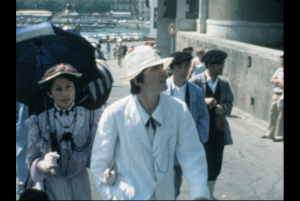
Euskal Ezkontzien erreportaia.
El filme retrata una boda vasca.
The film depicts a Basque wedding.
Imágenes del bosque / Images of the forest.
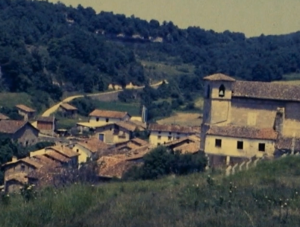
Corto documental sobre el pueblo de Izkiz , en el que el narrador describe de forma poética el pueblo entre planos de paisaje y arquitectura de este mismo. Mientras se recitan varias poesías aparecen imágenes de casas, tejados, laderas, ventanas, calles, la iglesia, casas abandonadas, animales, personas, niños –jugando o andando en bicicleta –, personas mayores, escenas de campo y vida campesina, escenas vacacionales, invernaderos, flores, insectos, el río, etc.
Documentary short about the town of Izkiz, in which the narrator describes the town in a poetic way while the film shows shots of landscapes and architecture. While several poetries are recited, we see images of houses, roofs, hillsides, windows, streets, the church, abandoned houses, animals, persons, children –either playing or riding bikes–, elderly people, countryside and country life scenes, vacation moments, greenhouses, flowers, insects, the river, etc.
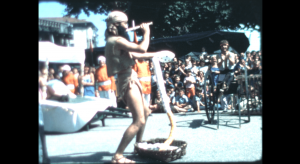
Desfile de gente disfrazada por las calles de Lekeitio hasta llegar a la plaza donde se reúnen todos y hacen sus respectivos espectáculos.
A parade of people in costumes in the streets of Lekeitio, until their arrival to a square where everyone meets and perform.
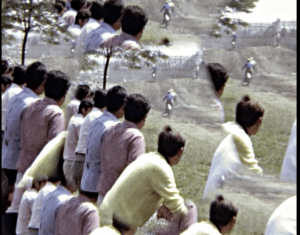
El filme comienza con una descripción de como iniciar en el Cross. Vemos un campeonato de Cross desarrollarse en los alrededores de Álava y la premiación a los
ganadores. Un joven se ilusiona por ser corredor de Cross.
The film begins with a description on how to begin cross country running. Then a cross-country championship is seen developing in the surroundings of Alava, and then we see the awards ceremony for the winners. A young man is seen getting excited about becoming a cross country runner.
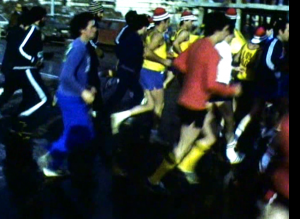
El filme muestra una carrera en la que se observa la presencia de nieve en la calle y la carretera por donde corren los participantes. La película está editada con una entrevista y aparecen fotografías del cross popular y de los participantes. Hay una voz en off durante algunas partes de la película que narra y comenta la carrera de forma informal y con un toque de comedia. El locutor habla del pelotón como si fuese el parte de ellos y si los estuviese animando. Se muestran varias entrevistas con participantes y termina con algunos planos de la ciudad ya finalizada la carrera como la retirada de las vallas de seguridad y del polideportivo.
The film shows a race in which there is snow on the street and on the road where the participants run. The film includes an interview and overlapped images of the popular cross and the participants. An off voice narrates the race in an informal manner with a touch of comedy. The narrator talks about a platoon as if he were part of it and cheers them on. Several interviews with participants are shown and the film ends with shots of the city once the race is over, like withdrawing security fences and images of the sports center.
Total Pages: 299